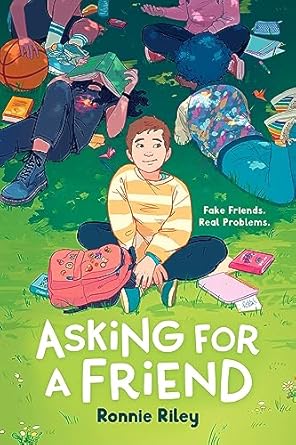Asking for a Friend

Asking for a Friend
I blink at the sound of the voice and look over to see that the person is, indeed, talking to me. My lips part, but no response comes out.
I guess that’s enough for Duke Herrera to keep talking, though.
“Can I sit here too?”
“Um, sure,” I manage.
It’s weird that he asked to sit down. Normally no one notices me long enough to recognize that I’m here. I’ve worked on multiple projects with people who ask me what my name is again. It’s so embarrassing to reintroduce myself to someone I know. I always wish the world would open up and swallow me whole. “ (Pp. 3-4)
After moving to a new middle school, Eden is having trouble making friends. Their mother agreed to move them to this school because of an unfortunate experience in the previous school. When they revealed that they were nonbinary to their best friend Nikki, Eden is devastated by Nikki’s rejection and needs a new start. Eden’s mother is very anxious about the new environment and urges them to make friends. In an effort to calm their mother’s anxieties, Eden lies about having a group of friends including Duke, Tabitha, Jackie, and Ramona. However, none of this is true. “I’ve been lying about us hanging out for the past month. That all my stories are made up? That I don’t really have any friends at all?” (p.12)
When their mother starts planning a 13th birthday, she asks Eden to invite their friends. Eden must now either confront the lies or invite their classmates to the birthday party. Their social anxiety is at a fever pitch when popular basketball player Duke Herrera starts talking to them. Eden and Duke enjoy their conversations. Duke even reveals to Eden that he is trans, and Eden reveals that they are nonbinary. They strike up a new friendship. However, their efforts to get to know the popular Ramona are unsuccessful at first. “She’s a Somebody, and I’m a Nobody.” (p. 18)
Eden and Duke start to hang out at Uncle Moe’s bookshop where they share books they enjoy. Through a series of chance encounters, Eden and Tabitha also start to talk and get to know each other. Tabitha is in foster care, and she also reveals to Eden that she is a lesbian. They, too, become friends and start hanging out with Duke. The group expands to Jackie who is genderqueer and pansexual Ramona who is being bullied by Alexandra and her volleyball team despite her supposed popularity. Eden starts to hope that they will actually be able to invite these new friends to her birthday party when the bully Alexandra changes everything.
Eden is an intriguing character who must learn to deal with a myriad of changes. Their social anxiety reaches a fever pitch several times in this novel. They try to deal with it using the deep breathing exercises recommended by their therapist; however, at times, they must simply escape the situation to cope with the stress. When cruel bully Alexandra reads Eden’s journal out loud to their friends, Eden is devastated and simply hides at home for several days because they cannot face their friends who now know about the lies and deception. With the help of their mother and later their friends, Eden learns that friendship can withstand difficult circumstances!
Readers who are experiencing social anxiety, friendship issues, or are questioning their sexuality will enjoy this novel. The relationships developed in this novel are portrayed in a genuine and sensitive manner. The author also includes very useful information at the end of the book in her “Queer Glossary” which provides definitions regarding gender and sexuality. It also lists resources on anxiety, mental health and foster care.
Some readers might find the storyline overly emotional at times, but the roller coaster emotions experienced by several characters are a reflection of the writer’s experiences with “transphobia, panic attacks, and anxiety disorders.” Ronnie Riley dedicates this novel “To all the nonbinary, genderqueer, and trans kids past, present, and future.” Perhaps the most powerful message in this novel comes from Eden’s mom, “We don’t go through life alone…We’re constantly surrounded by people, and if we’re lucky enough, we call some of them friends.” (p. 216)
Myra Junyk, who lives in Toronto, Ontario, is a literacy advocate and author.
